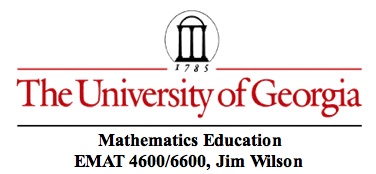

Dunham, W. (1990) Journey through genius: The great theorems of mathematics. New York: Wiley. (Also publish in 1981 by Penguin Books in paperback)
Polya, G. (1945/1956). How to solve it: A new aspect of mathematical method. Princeton, NJ: Princeton University Press.
Polya, G. (1962). Mathematical discovery: On understanding, learning and teaching problem solving (vol. 1). New York: Wiley. (1981 re-issue of this text with a combined volume 1 and volume 2.)
Polya, G. (1965). Mathematical discovery: On understanding, learning and teaching problem solving (vol. 2). New York: Wiley. (1981 re-issue of this text with a combined volume 1 and volume 2.)
Schoenfeld, A. H. (1992) Learning to think mathematically: Problem solving, metacognition, and sense-making in mathematics. In D. Grouws (Ed.), Handbook of Research on Mathematics Teaching and Learning (pp. 334-370). New York: MacMillan.
Schoenfeld, A. H. (1979). Can heuristics be taught? In J. Lockhead, Cognitive process instruction. Philadelphia, PA: Franklin Institute Press.
Schoenfeld, A. H. (1983). Episodes and executive decisions in mathematics problem solving. In R. Lesh & M. Landau, Acquisition of mathematics concepts and processes. New York: Academic Press
Schoenfeld, A. H. (1985). Mathematical problem solving. Orlando, FL: Academic Press.
Schoenfeld, A. H., (1985). Metacognitive and epistemological issues in mathematical understanding. In E. A. Silver, Teaching and learning mathematical problem solving: Multiple research perspectives (pp. 361-379). Hillsdale, NJ: Lawrence Erlbaum.
Schoenfeld, A. H. (1987). Cognitive science and mathematics education: An overview. In A. H. Schoenfeld, Cognitive science and mathematics education. Hillsdale, NJ: Lawrence Erlbaum.
Schoenfeld, A. H. (1988). When good teaching leads to bad results: The disasters of "well taught" mathematics classes. Educational Psychologist, 23, 145-166.
Schoenfeld, A. H. (1989). Explorations of students' mathematical beliefs and behavior. Journal for Research in Mathematics Education, 20, 338-355.